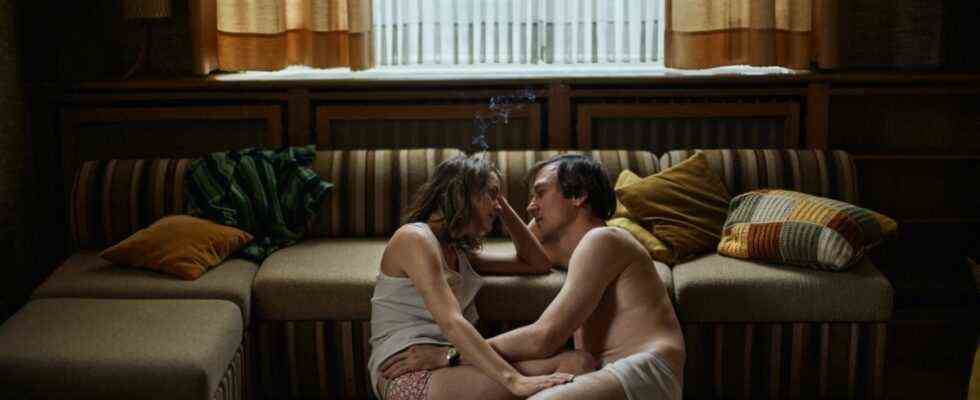At the end of the courtroom, Franz Walter is asked whether it was a must or a will. He is already charged with attempted espionage and desertion. Must or want? This question basically runs through the entire film. The question of free will. The decision for or against life paths that open up in front of you. Never knowing whether you are in the right place at the right time or in the wrong place at the wrong time. And anyway: How free are you in the constraints of a political system?
The state that Franziska Stünkel’s historical drama “Close Shot” is about is the GDR. The time: the second half of the seventies. The young scientist Franz Walter (Lars Eidinger) lives here. He has just completed his doctorate at Berlin’s Humboldt University, when the chance of a lifetime opens up for him: he should soon take on a professorship. There is also a new, luxuriously furnished apartment for the GDR standards. “We’ll be doing really well here,” he says to his fiancée Corina (Luise Heyer) and puts a record of City up, with the grin of a man who can hardly believe his luck. There is something claustrophobic about the scene – the narrowness, the light, the ominous mood. One suspects: Of course everything is too good to be true.
Werner Teske was killed in 1981 by the executioner with an “unexpected close-range shot”
Because the state demands something in return for the privileged life. Franz should show his appreciation and work for the Stasi for a year, more precisely their foreign secret service, the intelligence headquarters. Franz agrees without much hesitation. He quickly signs his declaration of commitment while still wearing his coat, including confidentiality.
The film deliberately leaves its motifs in the dark. Maybe Franz wants to make a career at any cost. Perhaps the temptations are too great. Perhaps he still believes in the GDR and the great task of “securing peace”. Maybe he’s just too gullible. Maybe a little bit of everything.
Lars Eidinger in “Close Shot”.
(Photo: Alamode / dpa)
In any case, he is soon on his first excursion to the west with his command officer Dirk Hartmann (Devid Striesow) in a Hamburg bar and follows the dance of the party lights with fascination. They are targeted on a football player who has fled to Germany and who is to be forced to return with the help of a meticulously planned system of informants, extortion and deception.
The filmmaker and photo artist Franziska Stünkel based her script on a real case: the life and death story of Werner Teske. In 1981 the economist was the last defendant to be sentenced to death in the GDR and executed by a so-called “unexpected close-range shot”, an execution based on the Soviet model, in which the executioner sneaks up on himself and shoots him in the back of the head. With the GDR death penalty, Stünkel focuses on a chapter from recent German history that the SED leadership shamefully covered up (because the judgments themselves bent the vague GDR law) and only officially abolished it in 1987.
The filmmaker, who won the New German Cinema Award for the best screenplay at the Munich Film Festival, could undoubtedly have turned this material into a versatile German-German spy thriller. The case would have given it. But Stünkel is in her excellently equipped and darkly smoldering film in brown, gray and sepia tones about the psychogram of a man who is entangled in a ruthless system – and in his own guilt.
Franz is eloquent and ambitious, but not an unscrupulous type, but rather thin-skinned. His pressure chamber is his conscience. And as the Stasi mercilessly turns human lives through the meat grinder in order to maintain the system, it wears down more and more. He wants to get out, wants to flee, but the adjusting screws are already too tight – and he’s been an accomplice anyway, a cog in the machine.
He is a victim and a perpetrator, he has to participate and he wants to participate
For Lars Eidinger this Franz Walter is a prime role. A man haunted by dark forces, as he has already convinced in other film and theater roles. In all his contradictions, he plays the scientist, who soon crumbles mentally and is estranged from his family. The more desperately Franz tries to escape his wrong life, which he has decided for himself, the closer the camera moves in long shots, the closer the image becomes, until it ends up being overwhelming in the courtroom Close-up even cropped the face.
Franziska Stünkel (born 1973 in Göttingen) could be reproached for the fact that the GDR, which she shows in her film, appears once again exclusively as this monstrous, paranoid injustice state in a dark palette of colors that she undoubtedly was, but not exclusively . In return, Stünkel manages an exciting differentiation with its main character: Franz is not such a painful and melancholy figure as the Stasi captain in “The Lives of Others”. But it does raise questions. Because he is both victim and perpetrator. His life is a self-chosen prison – and at the same time an imposed one. In the end, he is ready to do some outrage and still wrestles sympathy from the viewer. Franz can no longer get out of the path in which he has steered his life. Or maybe he never had a choice. Want or have to – that it is difficult to tell apart until the end is the great strength of “Close Shot”.
Germany 2021 – Direction and script: Franziska Stünkel. Camera: Nikolai von Graevenitz. Editor: Andrea Mertens. With: Lars Eidinger, Luise Heyer, Devid Striesow, Paula Kalenberg. Alamode, 116 minutes. In the cinema.

